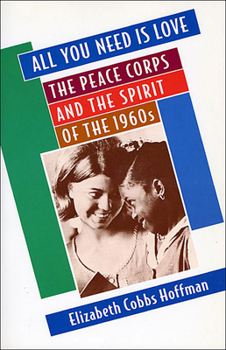All You Need is Love: The Peace Corps and the Spirit of the 1960s
Select Format
Select Condition 
Book Overview
The nation was powerful and prosperous, the president was vigorous and young, and a confident generation was gathering its forces to test the New Frontier. The cold war was well under way, but if you could just, as the song went, "put a little love in your heart," then "the world would be a better place." The Peace Corps, conceived in the can-do spirit of the sixties, embodied America's long pursuit of moral leadership on a global scale. Traversing four decades and three continents, this story of the Peace Corps and the people and politics behind it is a fascinating look at American idealism at work amid the hard political realities of the second half of the twentieth century. More than any other entity, the Peace Corps broached an age-old dilemma of U.S. foreign policy: how to reconcile the imperatives and temptations of power politics with the ideals of freedom and self-determination for all nations. All You Need Is Love follows the struggle to balance the tensions between these values from the Corps' first heady days under Sargent Shriver and beyond to the questioning years of the Vietnam War, when the Peace Corps was accused of being window dressing for imperialism. It follows the Peace Corps through the years when volunteering dropped off--and finally into its renewed popularity amid the widespread conviction that the Peace Corps preserves the nation's finest traditions. With vivid stories from returned volunteers of exotic places and daunting circumstances, this is an engrossing account of the successes and failures of this unique governmental organization, and of the geopolitics and personal convictions that underpin it. In the end, the question that is most compelling is whether the Peace Corps most helped the countries that received its volunteers, or whether its greater service was to America and its sense of national identity and mission.
Format:Paperback
Language:English
ISBN:0674003802
ISBN13:9780674003804
Release Date:October 2000
Publisher:Harvard University Press
Length:318 Pages
Weight:1.20 lbs.
Dimensions:0.8" x 5.9" x 9.1"
Customer Reviews
3 ratings
BUY THIS BOOK!
Published by Thriftbooks.com User , 15 years ago
Time is the best judge of worth. Nearly fifteen years after its initial printing and I used it extensively during the preparation of my own Peace Corps history book to be published in the winter, 2011. This book is the gold standard for anyone interested in the Peace Corps.
Simply Wonderful
Published by Thriftbooks.com User , 21 years ago
I thought this book was amazing and the author was simply wonderful. Thank you Elizabeth Cobbs Hoffman for this gift.
A reflection of its time
Published by Thriftbooks.com User , 24 years ago
In the 1960s many Americans attempted to redefine their nation's identity both at home and abroad. No institution reflected this attitude better than the Peace Corps. In All You Need is Love Elizabeth Cobbs-Hoffman explores the history of the corps, and reveals, that by tracing its development in the last forty years, one can gain a better understanding on how it became the quintessential institution of social reform in the 1960s. Cobbs-Hoffman begins her narrative by exploring the background of American idealism. She asserts that the United States, since its founding, has perceived itself as a crusading nation whose mission has been to promote the spread of its form of "benevolent" democracy. This idealism, however, has often clashed with the reality that states, like individuals, sometimes act for selfish reasons, and not for the good of others. This contradiction has often made Americans uncomfortable with their role in the world of power-politics, and as a consequence Cobbs-Hoffman asserts that, "Paradoxically when the United States has been at its most expansionist, it has been most subject to idealism. The late 1950's and early 1960's was one such a period. The country, in the twenty years after World War II, experienced an era of unprecedented economic growth, and increased military and political might. This preeminence, however, created conflicting emotions for many Americans, whose pride in this strength, was matched by their historical perception that power corrupted Americans' virtue. Revolted by the consequence of extreme nationalism and racism in Nazi Germany, numerous Americans took to the concept of universalism, and its belief that all humans deserved the same rights, regardless of nationality. McCarthyism, and the overt racism of the 1950's, made Americans grapple with their vision of what kind of country they lived in. Were they becoming just another fascist state; a place where the individual had no power over the vast machinery of an unfeeling state? With the election of the John F. Kennedy in 1960, Cobbs-Hoffman shows how these feelings of unease were coalesced into the foundation of the Peace Corps, a movement that attempted to show the world the altruistic side of U.S. power. Cobbs-Hoffman's history shows that Americans and historians have tendency to divide the world into good and evil, and that the political right and the left have a tedency to percieve each other as diametrically opposed. Cobbs-Hoffman would argue that both are inexorably linked. She calls the Vietnam war the Peace Corps evil twin, and in many ways this is true. Both were initiated with a spirit of naivete and the belief that they could show others American superiority. Each had their view of the world altered by the cultures and realities which they encountered, and often for both it was a humbling experience. In the end, the left's and the right's disdain for the spirit of the sixties reveal that the Peace Corps attained its






